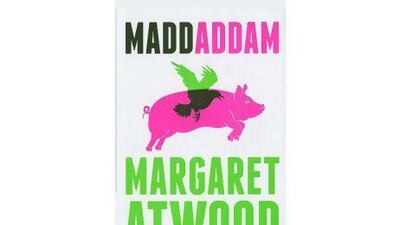MaddAddam
Margaret Atwood
Bloomsbury
As is oft quoted, Margaret Atwood doesn't write sci-fi. MaddAddam, the third and final book in the trilogy she began with Oryx and Crake and The Year of the Flood, is, in her words, "speculative fiction." This novel, she takes care to explain, "does not include any technologies or biobeings that do not already exist, are not under construction, or are not possible in theory" - a chilling claim that immediately transports us from the realm of the fantastical and into a disturbing chamber of horrors.
The trilogy tells the story of the various survivors of a global pandemic that wiped out most of humanity, leaving only a few waifs and strays in its wake, the stories of their pre-plague lives intertwined with the post-apocalyptic present. In the course of the series, the characters flit in and out of each other's stories, but here in MaddAddam those remaining have formed a united front, the remnants of an old civilisation forging the beginnings of a new. For those readers eagerly anticipating this final volume, it satisfyingly ties ups the loose ends of the previous instalments - filling in back stories and plugging narrative gaps. The final impression given is of an intricate but seamlessly stitched-together patchwork quilt.
Despite her protestations, Atwood's "speculations" tick all our sci-fi boxes - from the gentle green-eyed Crakers, "strange gene-spliced quasi-humans" bio-engineered to replace humanity; the wild pigoons that roam the forests, giant pigs with hog-like tusks made crafty by the human brain tissue spliced with their DNA; to the rogue Painballers, ex-cons who've survived a Hunger Games-esque kill-or-be-killed gladiatorial fight to the death, for whom rape and murder is now recreational. But MaddAddam is also a rather charming love story; that between the hippie healer Toby who can talk to bees, and the ex-bioterrorist street-smart Zeb.
As with the previous two novels, flashbacks play a significant role - this time it is Zeb's story that takes centre stage. He tells Toby of his past - how he put his accomplished hacking skills to considerable use to siphon money from the coffers of his violent father's cult, enabling him and his brother Adam to effectively "disappear"; his subsequent life of "flimsy cover stories", always on the move from city to city; and the tangled story of his involvement with the God's Gardeners, a green religion where he first met Toby, and then the MaddAddamite bioterrorists - and she in turn translates it for the Crakers, though she "skirts the darker and more tangled corners of reality", as these prelapsarian innocents struggle to understand motivation beyond that for basic survival and pleasure.
There is much in these books to warn about the dangers of interfering with the natural order of things. The corporation-run labs might well have been destroyed, but the surviving humans still have it in their power to influence evolution. On a whim, Toby teaches little Blackbeard, one of the Craker children, to read and write, but "What comes next? Rules, dogmas, laws?" she immediately wonders. These susceptible creatures already live by the word of their creator, Crake, so now surely it's only a matter of time until "The Testament of Crake" appears? "Have I ruined them?" Toby speculates; is she an unassuming serpent in a genetically engineered Garden of Eden?
Biblical echoes aplenty, Atwood's story is also full of false prophets: Crake, the evil genius with a God complex who engineered the plague; Zeb and Adam's father, the twisted Reverend of the Church of PetrOleum ("What is more valued by us today than oil? You have to give it to the rancid bugger"); and even, to a certain extent, the eco-friendly, all natural Gardeners. But among the din of all this preaching and proselytising, it's the Gospel of Blackbeard that rings out true and clear. "Now I have added to the Words, and have set down those things that happened after Toby stopped making any of the Writing and putting it into the Book," he writes. "And I have done this so we will all know of her and of how we came to be. And these new Words I have made are called the Story of Toby."
There is light at the end of the tunnel, but the journey has been dark and treacherous, and as with all truly disquieting dystopian fiction, Atwood doesn't deal in false promises. And, for a writer whose work has always been acclaimed for being at the vanguard of feminism, the future she envisages is particularly bleak for women - rape is an all-too-real threat, and they're still dogged by their reproductive biology - but then again, what was The Handmaid's Tale if not a warning of the same?
Don't be put off if you haven't read the first two volumes (not least because there's a handy recap at the beginning of the book), Atwood is still the imaginative and entertaining force to be reckoned with that she's always been, her writing as inventive, fresh and witty as ever: "Heart like shale," Zeb jokingly accuses Toby, "What you need is a good fracking."
lscholes@thenational.ae

